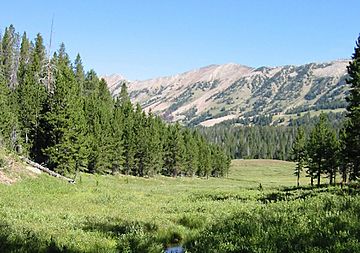Madison Range facts for kids
Quick facts for kids Madison |
|
|---|---|

Madison Range near Hebgen Lake
|
|
| Highest point | |
| Peak | Hilgard Peak |
| Elevation | 11,316 ft (3,449 m) |
| Dimensions | |
| Length | 80 mi (130 km) |
| Width | 25 mi (40 km) |
| Geography | |
| Country | United States |
| State/Province | Montana / Idaho |
| Parent range | Rocky Mountains |
The Madison Range is a beautiful group of mountains found in the Rocky Mountains of Montana and Idaho in the United States. This mountain range got its name from James Madison, who later became a President of the United States. He was the U.S. Secretary of State when Meriwether Lewis named the range in 1805. This happened during the famous Lewis and Clark Expedition as they traveled through Montana.
The Madison Range stretches for about 129 kilometers (80 miles). It goes from West Yellowstone, Montana all the way to Bozeman, Montana. The Madison River flows along its western side, and the Gallatin River runs along its eastern side. The very highest point in these mountains is Hilgard Peak. It stands tall at 3,443 meters (11,316 feet). This peak is quite remote, and climbers didn't reach its top until 1948!
Contents
Exploring the Madison Range
The Madison Range is a key part of a much larger natural area called the Greater Yellowstone Ecosystem. This huge ecosystem includes Yellowstone National Park and many surrounding wild lands. Most of the Madison Range is protected within two large national forests. These are the Beaverhead-Deerlodge National Forest and the Gallatin National Forest.
Special Protected Areas
A smaller, very special part of the range is even more protected. It's called the Lee Metcalf Wilderness. A wilderness area means the land is kept as wild as possible. This helps to protect the natural environment and the animals that live there.
Wildlife in the Mountains
The Madison Range is home to many amazing animals. You can find both grizzly bears and black bears roaming here. There's also at least one group of wolves living in the area. Many other large mammals that naturally live in this region also thrive in the Madison Range. These include animals like elk, moose, and deer.
Quake Lake and Its Story
Not far from Hilgard Peak, you'll find Quake Lake. This lake has an interesting and dramatic story. It was formed by a massive landslide in 1959. This landslide happened during a big earthquake, known as the 1959 Hebgen Lake earthquake. The earthquake was very strong, measuring 7.5 on the Richter scale. The landslide blocked the Madison River, and over time, the water backed up to create Quake Lake. It's a powerful reminder of how nature can change the landscape.
 | Jackie Robinson |
 | Jack Johnson |
 | Althea Gibson |
 | Arthur Ashe |
 | Muhammad Ali |




